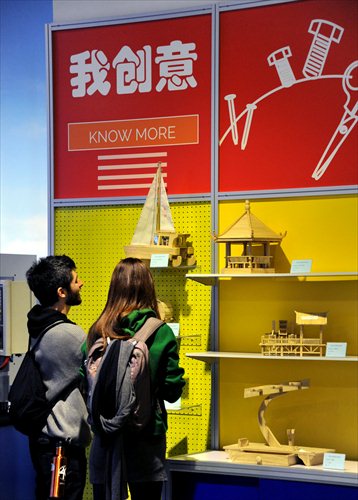Foreign entrepreneurs find Shanghai friendly for new businesses

Expats at an exhibition in Shanghai showcasing the works of entrepreneurs and makers Photo: CFP
It is one of the largest cities in China and Shanghai is also one of the most attractive cities in the country for foreign entrepreneurs. According to the Shanghai Municipal Commission of Commerce, Shanghai's total contracted foreign capital investment was worth US$58.9 billion in 2015, almost 86 percent up on the previous year.
Despite the booming interest, starting up a business in a foreign city is not easy, as expat entrepreneurs need to overcome barriers of language and cultural understanding and adhere to government regulations.
The Global Times talked to three foreign entrepreneurial businesses about their experiences in creating foreign-owned businesses in Shanghai, to learn their insights into handling the challenges they encountered.
Event specialists
Scot Jordan Campbell came to Shanghai around 10 years ago just after graduating in the UK, and he worked for a large international spirits company for six years. In 2012, he set up his own company, Verve International (http://www.verveintl.com/), a company specializing in events, exhibitions and brands.
Campbell told the Global Times there was a real need in the market across China for specialized event-creation services.
"Most events I attended were similar to each other, and people didn't feel that the brand was connected with them," Campbell said. "So the idea started to come that we needed an event company and promotional agency like we had in the West, where there was excitement, involvement and interaction."
Though his company is only four years old, it has been growing at a relatively fast pace. "We have been very lucky, because most young businesses need two to three years to become stable and not lose money. But we have been profitable since the first year," Campbell said.
Jay Thornhill is the 29-year-old American co-founder and head of product development with baopals.com, a newly-established online business platform. Thornhill said baopals.com was the first platform to give foreigners in China an easy way to shop at China's most popular e-commerce platforms, Taobao and Tmall.
"It brings its customers all of Taobao and Tmall's 800 million plus products, translated and updated in real-time, reorganized and catered to Western tastes, with easy payment, convenient delivery, and excellent service from the baopals team," he said.
Shopping problems
Thornhill explained that he and his friend had realized that many expats in Shanghai had problems shopping on Taobao and Tmall.
One of the big barriers was payment methods, because the options like PayPal and UnionPay that most expats were familiar with were not always available on Taobao.
He said another challenge was the language, as Taobao is entirely in Chinese and trying to translate piece by piece is problematic and often inaccurate. More importantly, he felt the way products and departments were organized on Taobao didn't cater to Western tastes.

The team behind baopals.com
In 2012 Tanya Golitsina, from Israel, and Marina Murakhovskaya, from Ukraine, opened their MT Studio, a fitness and dance center in Shanghai. Both of them had studied Chinese language and culture in their home countries before coming to China in 2007.
"We didn't come here with the idea of starting our own business - it was the result of our meeting and deciding to combine our qualifications, knowledge and experience in the health and wellness fields," Murakhovskaya explained.
Trained professionals in their fields, they noticed that there was a need in fast-paced Shanghai for a place where people could get good advice on wellness and fitness, nutrition and spiritual guidance.
They opened their "boutique" fitness studio in 2012. "We wanted to create a wellness place with a holistic approach that would lead people to a deeper transformation on many levels - mental, spiritual and physical," Golitsina said.
Although their business models were good, all three businesses encountered difficulties in getting established in China.
Unfamiliar with the laws
"For a foreigner here, there are also more obstacles. For example, I am not familiar with all the laws here," Campbell said.
To make sure his company followed the correct legal procedures, he paid about 25,000 yuan ($3,742) to get an agency to arrange the legal establishment of his company.
"We outsourced the legal set up of the company to an agency, so professionals from the agency did all the things for us," he said. "I felt that if I did all the things on the legal and procedure side, then I would lose focus and time on doing the most important thing, which was setting up ideas for the business."
He added that there were many agencies of this sort in China, and they could arrange all the documentation for foreign clients. "All I had to do was give my legal papers, my passport and sign documents. Everything was done properly, so we were completely legal," he said.
As well as completing the legal arrangements, Campbell said foreign entrepreneurs also needed to have money for the registered capital. Campbell had to deposit about 600,000 yuan to set up a wholly foreign-owned business. "This money could also be used for running my business," he said.
Like Campbell, Thornhill was also confused by local regulations and the legal requirements for setting up his business.
"It just isn't feasible without professional help. We asked anyone we could, and often heard different answers to our questions. Eventually we found advisors we could rely on and have been working with them ever since," he said.
Zhu Jun is a senior consultant at Zhishuo Investment, a service provider for investment and entrepreneurship in Shanghai. She told the Global Times that there were good reasons why expats preferred to pay agencies to arrange the setting up of businesses.
Many departments
"First, even for a Chinese person, it is quite complicated to deal with many government departments about the legal requirements involved in setting up things, let alone for a foreigner with language and cultural disadvantages," Zhu said. "Also, it usually takes several months to complete the registration process. But some foreigners are not in China during the registration stage, and can't get to these government departments themselves from time to time."
And different business sectors have different requirements. "For example, if a foreigner wants to establish a consulting company in Shanghai, we would suggest the client set aside between $50,000 and $100,000. But for some sectors that have higher requirements for capital investment, like finance leasing where foreign investors need to set aside millions of dollars."
Zhu said some business sectors are still off limits for foreign entrepreneurship, especially in the media industry. "Foreigners are not allowed to make movies or television series, publish newspapers or books in China," she said.
One of the keys to success that all agreed on was having a good mix of foreign and Chinese staff.
"There's always uncertainty in business, especially when you're in a foreign country that has different ways of doing things," Thornhill said. "It definitely helps to have great Chinese people on the team."
He hired Chinese staff to help him understand what shopping on Taobao and Tmall was all about. He also needed someone on his team to make sure he understood the local regulations.
Campbell agreed. Though he has been in China for around 10 years and understood a lot about Chinese culture, he felt it was vital to have locals in his team.
Local guidance
"I have several local staff. When I have something I don't understand, I ask them," he said. "They also give me little tips - they guide me on how to approach Chinese clients and when to push them and when to hold back."
And the other important aspect of doing business in China is guanxi (connections).
"Relationships are important everywhere in the world. But in China, people tend to put more emphasis on this - guanxi is king," Campbell said. "I could be wrong, but my impression is that in China guanxi is a little bit like a chicken sitting on her eggs waiting it to hatch. You need to keep it warm. After a while, slowly and slowly, things will happen."
He said expats in China should not dive into new guanxi and immediately talk about how they could help each other. "You've got to become friends first. Both people know it is guanxi from the beginning, but they won't say it. They could become very good friends but the end game is that they know they will help each other," Campbell said.
Thornhill agrees and has benefited from his social connections in Shanghai. "My alma mater, USC, has a pretty strong alumni community here and our first hire actually came from that community," he said.
To build more social connections in Shanghai, Campbell suggested that expat entrepreneurs join other groups and organizations - he is a member of the Entrepreneur's Organization, a global business network group.
"It is primarily for entrepreneurs that have just started up their businesses. I joined the Shanghai chapter. It is a good support network, and I highly recommend it to any entrepreneur," he said. "We meet often, and have talks, seminars and lectures on different aspects of business. We share our problems, issues and successes, and this made me feel I was not alone."
Murakhovskaya and Golitsina felt most of their business challenges came from adapting their vision of wellness to Chinese culture and putting together the right programs and combinations for the Shanghai market.

Tanya Golitsina and Marina Murakhovskaya
"Even though we both have lived in China for almost 10 years, both speak Chinese and have worked with Chinese people for many years, we still discovered a lot of new things after opening a fitness business here," they said. "We had to develop and use quite different approaches with local and foreign customers, and to adjust the marketing materials as well."
They also felt that expats faced fiercer competition in the local market and needed to make greater efforts than they were used to in order to stand out.
"There was a significant growth of the business, but it's important to keep developing constantly, especially in Shanghai - the competition in any business field is huge. Even if you offer unique products or services, there are still many others that offer something similar, or alternatives," Murakhovskaya said.
Campbell said many Chinese people wouldn't think about using his company as they tended to perceive that foreign businesses were more expensive than the Chinese counterparts.
Different levels
"In fact we have set different levels of pricing for different kinds of services," he said. "Clients that are willing to pay more can enjoy higher levels of service. But if some clients' budgets are tighter, they can go to less expensive packages, which are still very good quality."
Golitsina and Murakhovskaya suggested that it would help a lot if there were some government officials who could speak English.
"Even if foreign business owners do speak Chinese (we are both pretty fluent), you still feel very dependent and even lost, especially when it comes to all the administrative procedures during the establishment of the business," they said.
However Thornhill and Campbell thought the local government was quite supportive for foreign business.

Scot Jordan Campbell Photos: courtesy of the interviewees
"I am from the UK and we have lots of rules there for young businesses. But in Shanghai I think the government doesn't set obstacles for foreign businesses. Though it doesn't actively encourage, it encourages more by not getting in your way. I have nothing bad to say about them," Campbell told the Global Times.
Newspaper headline: How to succeed in Shanghai